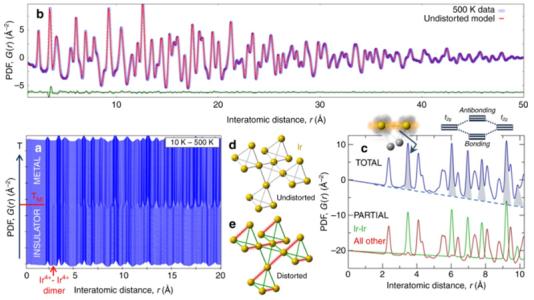
Scientific Achievement
Using the thiospinel CuIr2S4 as a prototype, we have identified a new framework for understanding lattice-charge coupling in quantum materials: orbital degeneracy lifting (ODL), an effect in which electronic degeneracies generate fluctuating local symmetry-broken states precursory to long range order.
Significance and Impact
Analogous ODL states are expected to be widespread among quantum materials with partially filled d-bands, providing a unifying construct to understand phenomena in a range of technologically relevant systems.
Research Details
- X-ray atomic pair distribution functions were measured on a fine temperature and composition grids on CuIr2S4 powder, and on Cr and Zn doped versions, at 28-ID-2@NSLS-II.
- The local structure requires a broken symmetry model to fit the PDF even when the average structure is cubic.
Sample syntheses and characterizations were performed at Argonne and Brookhaven national laboratories.
Argonne National Laboratory seeks solutions to pressing national problems in science and technology. The nation’s first national laboratory, Argonne conducts leading-edge basic and applied scientific research in virtually every scientific discipline. Argonne researchers work closely with researchers from hundreds of companies, universities, and federal, state and municipal agencies to help them solve their specific problems, advance America’s scientific leadership and prepare the nation for a better future. With employees from more than 60 nations, Argonne is managed by UChicago Argonne, LLC for the U.S. Department of Energy’s Office of Science.
The U.S. Department of Energy’s Office of Science is the single largest supporter of basic research in the physical sciences in the United States and is working to address some of the most pressing challenges of our time. For more information, visit https://energy.gov/science.